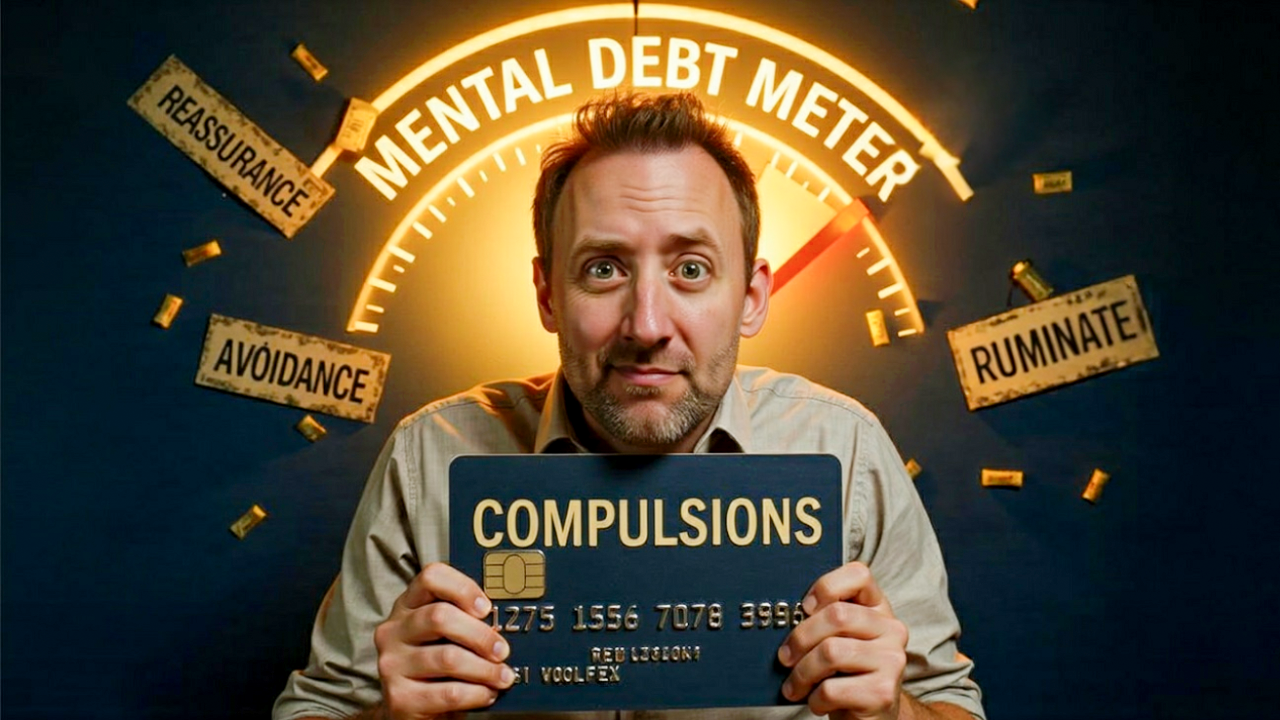Break The OCD Cycle: Don't Feed The Debt
Jul 30, 2025
Stop Paying the Mental Credit Card: How Compulsions Create Anxiety Debt
What if I told you that every time you give in to a compulsion, you're basically swiping a credit card that charges your peace of mind? That relief you feel when you check the lock "just one more time" or replay that conversation in your head isn't free - it comes with interest that compounds every single day.
The Hidden Cost of Compulsive Relief
When anxiety hits and your brain starts screaming "Do something now, fix it!" that urge to act feels like the express lane to shutting off the alarm. Whether it's mentally replaying a conversation, checking a lock for the 15th time, or asking your partner "Do you still love me?" for the third time today, these behaviors promise quick relief.
But here's the plot twist: you're not solving the problem. You're just borrowing comfort from your future self. Every time you swipe that mental credit card, you're training your brain's alarm system to scream even louder next time.
Why Your Brain Falls for the Compulsion Scam
Your brain has parts that are designed to find real problems and send out real danger alerts. But with OCD, there's something haywire - it's sending off alarms when there's no actual danger. Because you're not sure if there's real danger, you keep checking "just to be sure."
Think about it: if you were making toast and heard the smoke alarm, you wouldn't ignore it. You'd check, even if you were pretty sure it was just the toast. That's exactly what happens with OCD - your brain throws off alarms constantly, and checking feels logical.
The Debt Cycle in Action
Take harm OCD, for example. You're driving home, minding your own business, when your brain drops this lovely thought: "What if that pothole was actually a person?" Suddenly you're going back to check, comparing the feeling of driving over the same spot, but you're still not sure. The checking provides temporary relief but feeds the cycle.
The same thing happens with sensory motor OCD. Your brain suddenly decides to make you hyperaware of your breathing or blinking. Now you're noticing every breath, every blink, and it's exhausting.
Breaking Free with Exposure and Response Prevention
The solution isn't to convince yourself everything is fine - it's to refuse to play OCD's game entirely. When you recognize you're about to do a compulsion, ask yourself: "Do I want to keep swiping this card?"
Practical Steps to Stop the Cycle
Next time your brain says "Quick, do the thing," try this instead:
- Sit with yourself and fold your arms
- Tell your brain: "You're telling me I'm in danger? Let me look around. I don't see anything."
- Stay uncertain rather than seeking false certainty
- Hit the pause button for 10 seconds and let anxiety just be there
Going on the Offense
Don't just wait for OCD moments to hit you. Plan exposures for 10 a.m. Take that drive. Turn on the stove and turn it back off. Look at pictures that make you nervous. Whatever your fear is, go do that thing because you've planned it - and then don't fix it.
How to Know If It's Really OCD
If you're having the same thought over and over, it's making you anxious every time, and you look around but don't see actual danger - that's OCD. If it's a one-off thought that you have maybe once a year and think "weird, interesting," that's just a random intrusive thought.
The key difference is the urge to fix it or make sense of it. That urge is what signals OCD.
Breaking the Cycle One Choice at a Time
Every time you delay, modify, or undo a compulsion, you're making the OCD cycle a little bit weaker. People recover from OCD every day by making it a lifestyle of exposure and just living their life.
The goal isn't to eliminate uncertainty - it's to become comfortable with it. Your brain will never be satisfied at all times, but you can choose not to keep feeding the debt monster.
















